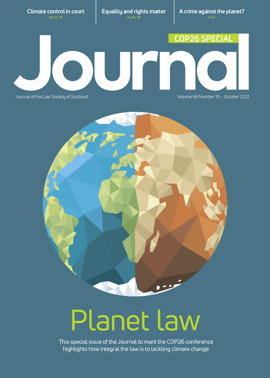Criminal court: Justiciary Office briefing
Editor’s note: The following is the first of what may be a series of briefing notes issued from time to time by the High Court over a trial period. These are intended to inform practitioners promptly of new criminal case law or approaches prior to the decisions being published in full. These notes will relate to cases which are still pre-trial and subject to restrictions regarding publication of information. Any further enquiries can be made to the appeals manager at amckay@scotcourts.gov.uk
Domestic abuse: sufficiency of evidence
The case of HM Advocate v DF (10 August 2021, unreported) relates to a minute raising a plea in bar of trial based on oppression. The first instance opinion was delivered by Lord Matthews. It is understood that his decision has not been appealed, but it is subject to embargo given that the trial is still outstanding. The point raised is of some significance and practitioners may be interested in it.
The question was whether, in respect of a charge under s 1 of the Domestic Abuse (Scotland) Act 2018, where there was corroborated evidence, accepted by the jury, of some parts of the libel (at least two episodes of abuse at a minimum), the jury would be entitled to convict in respect of other parts of the libel which were uncorroborated and involved three different allegations of non-consensual anal, vaginal and oral penetration.
Refusing the plea, Lord Matthews said at para 37:
“What I take from these authorities is that, while the doctrine of mutual corroboration has specific requirements such that evidence of physical violence cannot corroborate evidence of rape, all of this offending, at least in a domestic setting, can be viewed in appropriate circumstances as a course of conduct. The context of jealousy, humiliation and control echoes very closely the conditions in the 2018 Act, and in my opinion, where the conditions are met, disparate offences can be considered as part of a course of behaviour, there being no significant difference between the words ‘behaviour’ and ‘conduct’.”
At para 39 he stated:
“Drawing all this together, in my opinion the acceptance by the jury on corroborated evidence that two episodes of the abusive behaviour had been proved would suffice to warrant a conviction of the new offence. Whether they could also convict of uncorroborated elements would depend on whether or not they were satisfied that those uncorroborated elements formed part of the same course of behaviour. There requires to be some sort of nexus or link between the various elements, otherwise they would be simply separate incidents and not part of a course of behaviour. Whether or not that link exists will depend on the evidence in each case and may not be capable of delineating ab ante, although it might be found if the jury were satisfied, for example, that there was a continuity of purpose in that the accused intended or was reckless as to whether his behaviour, whatever it was, caused the complainer to suffer physical or psychological harm, in other words if the accused was pursuing the sort of campaign described in McAskill [McAskill v HM Advocate 2016 SCCR 402]. In my opinion it is not necessary that the individual incidents require to be of the same kind or of a similar kind to the full extent required by Moorov. That is part of the law of evidence rather than a substantive requirement of an offence. It will always be open to an accused person to submit that there was no case to answer where the evidence did not support a course of conduct.”
Regulars
Perspectives
Features
Briefings
- Criminal court: ID from CCTV
- Criminal court: Justiciary Office briefing
- Licensing: Passport to confusion
- Planning: COVID and NPFD update
- Insolvency: Winding up easier, but hurdles remain
- Tax: Government continues to bring in new taxes
- Immigration: Asylum from the Taliban?
- OPG: Update
- Property: Common parts – a welcome clarification
- In-house: Lawyer with natural energy






